Argentines Can Now Trace the Ship Their Croatian Ancestors Arrived On
May 9, 2022 - The Center for Latin American Migratory Studies developed an online search engine that allows you to find out, in just three steps, on what date and on what ship your Croatian ancestors set foot on Argentine soil.
Only with the surname, name, and validating the Captcha code it is possible to access the date of arrival of each of the immigrants who arrived in Argentina between 1800 and 1960, reports infobae.com. You will also be able to know which ship your Croatian ancestors traveled on and which port on the Argentine coast they arrived at.
All of this is now possible thanks to the online search engine of the Center for Latin American Migratory Studies (Cemla), which also allows us to find out what profession or occupation your Croatian ancestors had and from where in Europe they left. This possibility of knowing the history of each family that arrived in the country is the result of one of the most important tasks carried out by the organization, due to its meaning and scope.
Cemla was founded by Father Luigi Favero on December 28, 1985, preceded by the First Conference on Immigration and Identity, held in August of that year, and by the publication of the initial number of Latin American Migratory Studies, the first academic journal dedicated to exclusively to migratory issues in the subcontinent.
It also has an important Documentation Center specialized in national and foreign migrations from Argentina that has the objective of preserving the records of entry into the country for each of its ports as the first specialized library dedicated exclusively to migrations from Argentina. Currently, it has more than four thousand volumes between books and serial publications.
At the end of the 19th century and during the first decades of the 20th century, the great wave of European immigration to Argentina took place. Those who arrived, for the most part, came from Italy and Spain, but Ukrainians, Poles, Russians, Croats, French, Germans, Swedes, and Irish, among others, also arrived.
According to data from the University of Tres de Febrero and the book "Migration Policies in Argentina" by Susana Novick, between 1880 and 1915 more than 1,500,000 Europeans arrived on Argentine soil.
How to search in three steps
1. Enter the link: www.cemla.com/buscador/ (DUE TO GREAT DEMAND, THE DATABASE MAY PROVIDE ERRORS)
2. Write the surname and first name of grandparents, great-grandparents, or relatives who arrived in Argentina between 1800 and 1960.
3. Validate the Captcha code
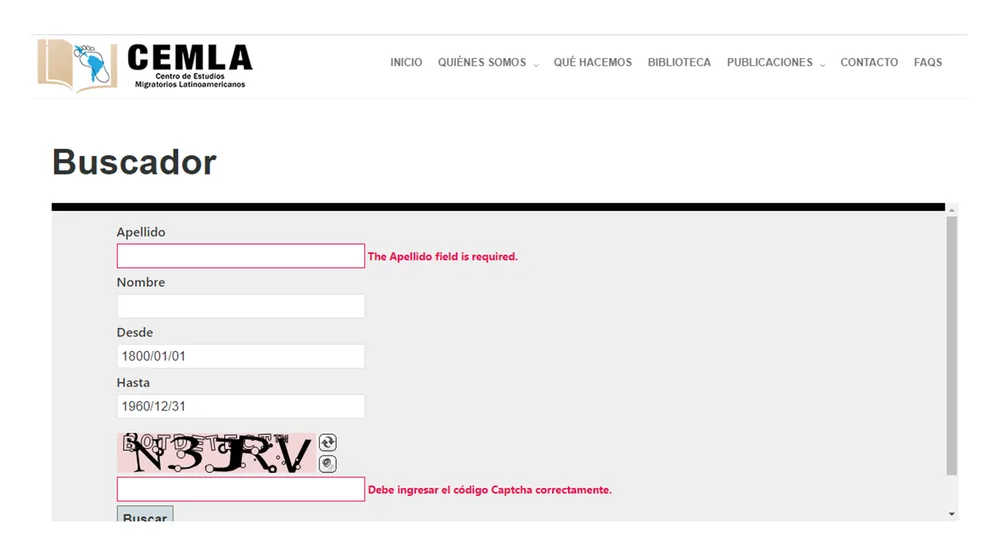
Image: infobae.com
Among its first tasks, Cemla began the preservation and microfilming of documentary sources of immigration in Argentina and, in particular, Italian immigration in Argentina, Uruguay, and Chile.
With the same desire to preserve history, it held special Congresses and Conferences that included the participation of specialists from various disciplines from both Argentina and Latin America.
For more news about the Croatian diaspora, visit our dedicated section.
Number of Chilean Undergraduates in Croatia Increases Twofold
ZAGREB, 26 March 2022 - The number of students from Chile attending university programmes in Croatia has doubled this year since the previous school year, and Croatia can expect even more Chilean undergraduates after the election of Gabriel Borić, who has Croat roots, as the president of that South American country.
This academic year, there are 45 Chilean students enrolled in the ongoing semester course of Croatian Language and Culture provided by Croaticum Centre in Zagreb.
Croaticum, established in 1962 as the Centre for Croatian as a Second and Foreign Language, is the oldest and largest institution engaged in teaching, research and description of Croatian as a second and foreign language. It is part of the Department of Croatian Language and Literature at the Faculty of Humanities and Social Sciences of the University of Zagreb.
In the last five years, 163 students from Chile have attended Croaticum programmes.
In Chile, a country with 19 million inhabitants, there are about 400,000 ethnic Croats, who make up 2.4% of the total population.
The newly-elected president Gabriel Boric is a descendant of Croatian emigrants, and his great grandfather arrived in Chile from the Croatian island of Ugljan off Zadar.
Lector for the Croatian language at the University of Magallanes in Punta Arenas, Kristina Barišić, has said that Boric's election has contributed to a growing interest of the Chilean general public in Croatia.
This was also an encouragement for Croatian expat communities, she told Hina.
Two undergraduates of that university, Makarena Mansilla Carrasco and Javiera Astorga Vodanić, are among the current students of the ongoing semester course of Croatian Language and Culture at Croaticum Centre in Zagreb.
Makarena has told the ITV Patagonia broadcaster that she was highly motivated to get better knowledge of the culture of Croatia.
This 26-year-old student of psychology has received a scholarship of the Croatian government and agency for mobility and EU programmes for the continuation of her education in Croatia.
Javiera, who enrolled in the Nutrition and Diet at the Health Sciences Department of the Punta Arenas university, says that the possibility of being awarded the scholarship for education in Croatia has given an additional impetus to her to learn the Croatian language.
Javiara, 23, who is currently staying in a student dorm in Zagreb, admits that the stories that Croatian is difficult to learn have additionally motivated her.
Thousands of Young South Americans Want to Immigrate to Croatia, Reports Večernji List
ZAGREB, 16 Feb 2022 - Tens of thousands of young people from South America, mainly descendants of Croatian expats, would like to immigrate in Croatia, the Večernji List (VL) reported on Wednesday.
However, a lack of knowledge of the Croatian language, as well as the lack of programmes to facilitate their integration into Croatian society, seem to be main barriers for the arrivals of young South Americans, according to the daily newspaper.
Croatia ranks high in the European Union (EU) in terms of the quotas of imported foreign workers outside the EU per number of inhabitants in the country, and the daily newspaper raises the question whether Croatia is ready to attract foreign students, researchers and foreigners with the Croatian roots.
In the EU the ratio of the imported foreign workers outside the Union per 1,000 inhabitants was 7, and in Croatia this ratio was 12 per 1,000 before the pandemic, the newspaper notes.
In 2021, there were 81,000 foreigners from third countries who were given status of temporary residents in Croatia.
In this context, the daily newspaper highlights the need of Croatia to attract also students, undergraduates and descendants of Croatian emigrants and not only less educated workers, criticising the state administration for not making this process easier.
For more, check out our lifestyle section.
Virtual Meeting on Migration Between Croatia and South America Continues Today
February 16, 2022 - The II International Meeting ''Migratory Processes between Croatia and South America'' began virtually yesterday in Croatian, and will continue today and tomorrow in Spanish with a program that addresses issues of history, present, and future of the migratory process between Croatia and South America.
Sponsored by the Central State Office for Croats Abroad, and The Institute of Migration and Ethnic Studies (Institut za migracije i narodnosti -IMIN), the Faculty of Croatian Studies of the University of Zagreb (Fakultet hrvatskih studija -FHS-UNIZG), the Institute of Social and Political Studies of Patagonia of the University National Institute of Patagonia "San Juan Bosco" (IESyPPat-UNPSJB), the Faculty of Education of the University of São Paulo (FE-USP), the University of Dubrovnik, the International Network of Researchers of Migratory Processes between Croatia and South America, and with the institutional endorsement of other higher education centers in South America, the II International Scientific-Professional Meeting Migration processes between Croatia and South America “Towards a transnational and transdisciplinary field of study” is being held this week.
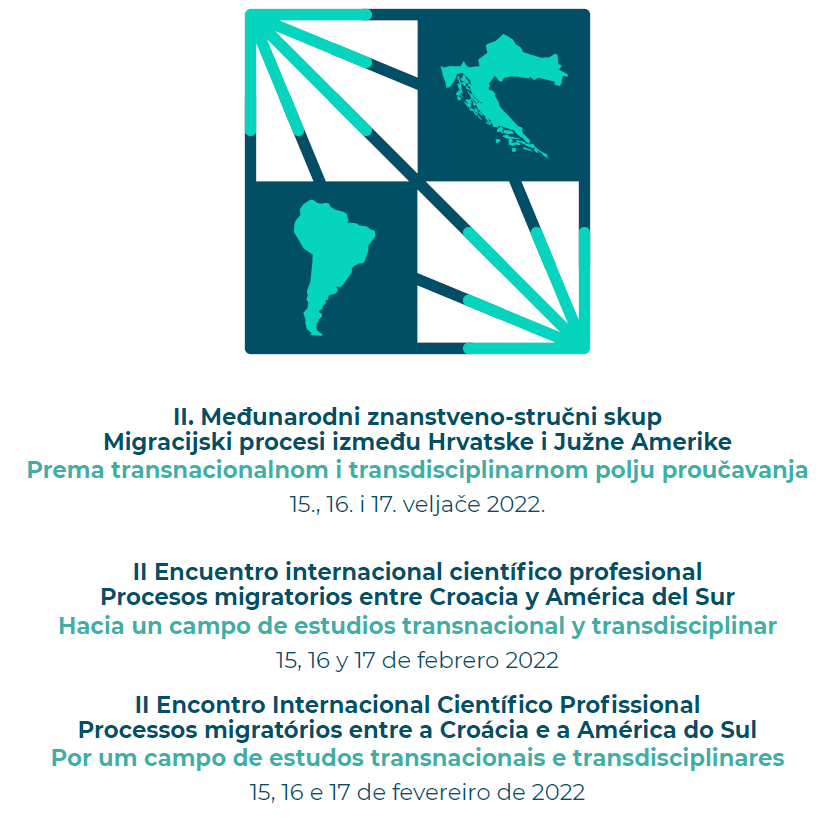
The meeting aims to generate an institutional space for permanent communication in which to exchange experiences, present research results, discuss theoretical and methodological challenges, promote innovative analytical approaches and collaborate in the creation of an international network that addresses different aspects of the processes migration between Croatia and South American countries.
The previous meetings that served as background brought together seventy researchers and professionals from countries such as Croatia, Bosnia and Herzegovina, Argentina, Chile, Peru, Bolivia, Brazil, Russia and Venezuela, and discussed problems related to heritage, identity, collective memory, cultural policies, integration policies, return migrations, the various activities of the Croatian community in South America, language teaching and learning, the role of women in migratory processes, historical aspects, methodological challenges, archival issues, among others. This analytical richness and thematic varieties are part and content of a book, which aims to compensate for the lack of interdisciplinary approaches, helping to increase dialogue between researchers from different countries with a view to strengthening a transnational and transdisciplinary field of study.
This year, the meeting takes place from February 15 to 17. Yesterday the program started virtually with speakers who developed various topics in Croatian, and others will join today and tomorrow in Spanish. Today the program starts at 1:00 p.m., and will touch on cultural and political analysis of the migratory processes between Croatia and South America, preservation of cultural heritage, the Croatian language, international relations and geopolitical dimensions of the migratory process.
Tomorrow it will start at the same time, and there will be talks throughout the day about access to sources and archives on Croatian migration in South America and their use for research on the migratory process, the social and economic frameworks of the migratory process will be analyzed, the labor market, the cultural dimensions and the power of writing in the investigation of the migratory process, and the new approaches and challenges in the study of the migratory process between Croatia and South America will be presented. Finally, a closing of the II Encounter will take place.
To join the session on Wednesday 16 (today), you can do so via Zoom and YouTube. For the session on Thursday 17 (tomorrow), you can also do it on Zoom and YouTube.
To download the complete program with the schedules, contents and information of the speakers, click here.
To download the content book with the research carried out on the migratory process between Croatia and South America, click here.
For general information about the International Scientific-Professional Meeting, click here.
For more news about the Croatian diaspora, visit our dedicated section.
Croatian Diaspora in South America: The Story of Nadia from Argentina
June 17, 2021 - Reuniting with your Croatian ancestry can go in many ways. Many of the Croatian diaspora in South America tirelessly seek to trace their roots, and several of them without success. The chances of accidentally meeting your distant relatives are always low, but this is what surprisingly happened to Nadia from Argentina.
Every year, lists are written in media and blogs everywhere to rank Croatian destinations, facts, and people, but I don't know if it has occurred to anyone before that Croatia, in addition to its beaches, its islands, its nature, its Roman, Venetian, Austro-Hungarian, and Yugoslav heritage, its geniuses (both in science and sport) and more, Croatia could also be known for its surprises. It is true that being Croatian, of Croatian descent, or living in Croatia can surprise one on various occasions, and not always in a negative way.
Of course, there are known surprises that one can get when going to the police station to carry out a procedure, or when sitting at the table of a Croatian family at lunch, or after a rakija tasting. But some of its most interesting events happen when reconnecting with your Croatian ancestry. Not only through my own experience, but I know of many, many people over the years who have failed to find out more about their ancestors rather than the simple fact that they were Croats.
As the years go by, it becomes more difficult to connect the evidence that one finds to solve numerous questions such as the year their ancestor was born, where they were born, when did they leave Croatia, why did they leave Croatia, what did they do while living there, what did they do after arriving at their new country, and so on. This is very difficult to solve, especially for the large Croatian diaspora in South America, a distant continent in so many ways beyond what’s measurable. If there’s something I know, it is that one of the decisions that can facilitate this search is to return to the mother country. It is not a guarantee, but it can definitely bring you closer to the answer you are looking for.
But what if one is not looking for it? It does not mean that there is no type of interest, but precisely it ceases to be a priority when it becomes so difficult to know something about our origins. When you find something you were looking for, it always brings a pleasant sense of success and fulfillment. But when it is unexpected, the feeling of joy can be equal or even greater. This is what I thought when I first heard about Nadia's experience. But I feel like the story will feel more magical if it is shared through her own words. Meet Nadia Milevčić, a returnee from Argentina.
What country are you from and when were you born?
I am from Argentina, I was born in Buenos Aires in October 1994.
When did you know that you were of Croatian descent?
I can't give you an exact date because it's something I've known for as long as I can remember. Perhaps because of my last name, the fact of being of Croatian descent was always something very present. My dad's four grandparents were Croatians and he talks a lot about them and the things they taught him. My grandmother, daughter of Croats, used to speak to me in Croatian when my brother and I were young. She also told me about our family, about the city of Split in Dalmacija, and about the history of Croatia as a country. For all these things, the Croatian heritage was very important in my family.
When did you decide to travel to Croatia and what motivated you?
In 2018 I started thinking about studying abroad because I wanted to have the experience of living in a totally different environment from mine. First I thought that this trip would be related to something in my career. At that time I had two years left to finish my Bachelor of Arts degree and I looked for some scholarships in other countries, but nothing appeared.
I started thinking about studying in Croatia when I went to the Buenos Aires embassy to find out how to begin the process of Croatian nationality and the woman who worked there told me about the Croaticum program. It seemed to me that the idea united my desire to live in a totally new place and also my desire to finally know that country that I had been told so much about. In March of that year, I began to work on my project and began to study Croatian in Buenos Aires while waiting for the opening of the call for the scholarship program. That year I applied but did not win. It was very disappointing, but later I understood that it was not yet my time to leave Argentina. In 2018 I also finished the annual Croatian course and continued to search for papers that could help me to prove my Croatian ancestry more clearly.
In 2019, the last year of my degree, I applied for the scholarship again and won it. That same year, a distant cousin of mine contacted me from Croatia saying that we were family. At that time my idea was not only to get to know the country of my great-grandparents and live in it for a while but also to reestablish the bond with the rest of my family in Croatia, of whom I did not know any of them.
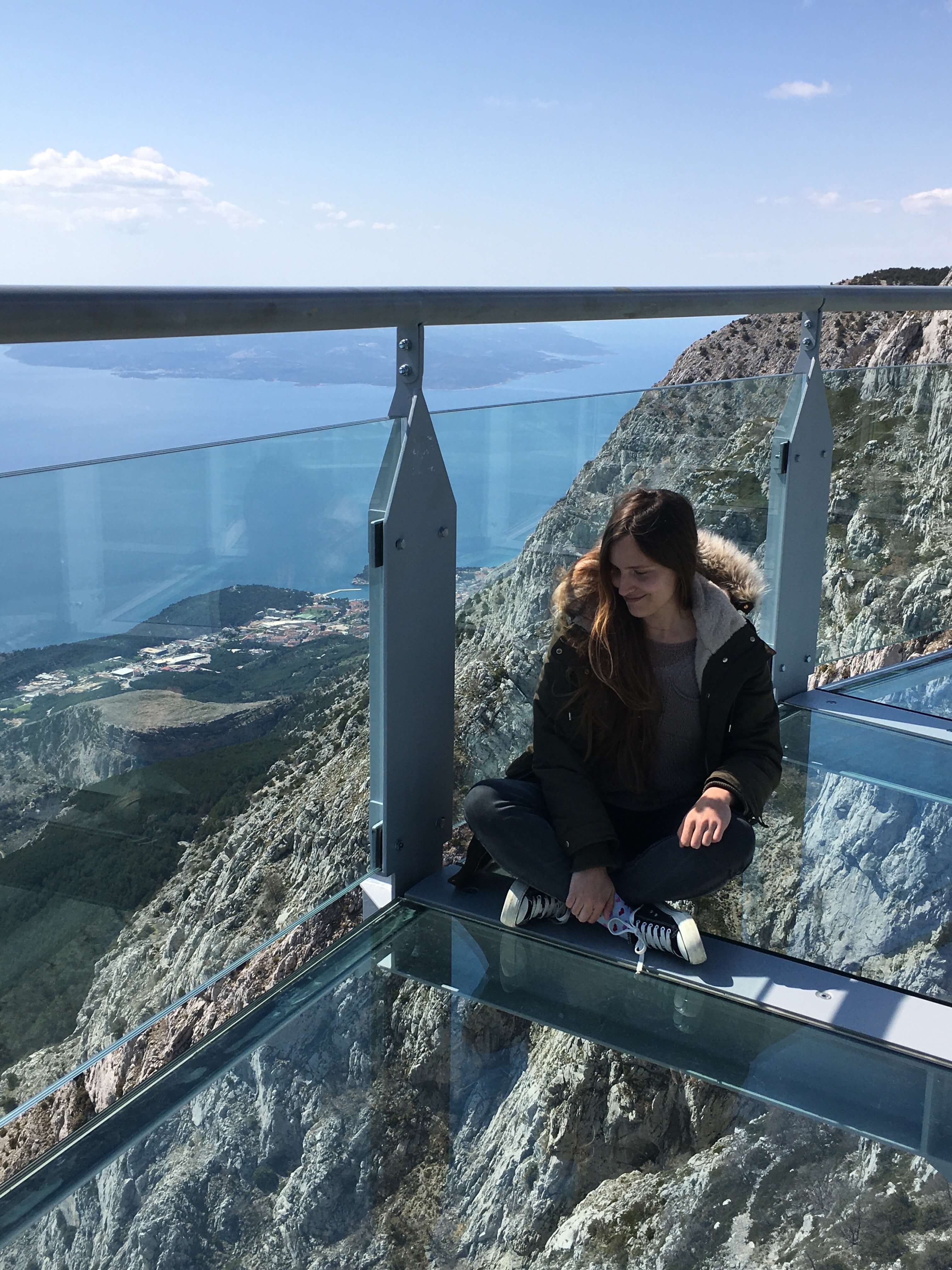
Nadia on the popular Biokovo Skywalk, the same day she met her distant Croatian relatives. (Personal album)
What was your impression when you first arrived?
My first impression of Croatia was that everything was very beautiful and that the people were very friendly. When I met my cousins they seemed to me to be very open and very loving people. The first month I was delighted with everything I saw, it seemed to me that everything was very organized and I felt very safe.
How did that impression evolve over time?
After living here for a year and having moved several times, I also began to see the negative side. All countries have something good and something bad, it is normal. There are things that I don't like and I think that's part of living in the reality of a country and getting out of that stage of infatuation in which I was at the beginning. Now I have a more realistic impression.
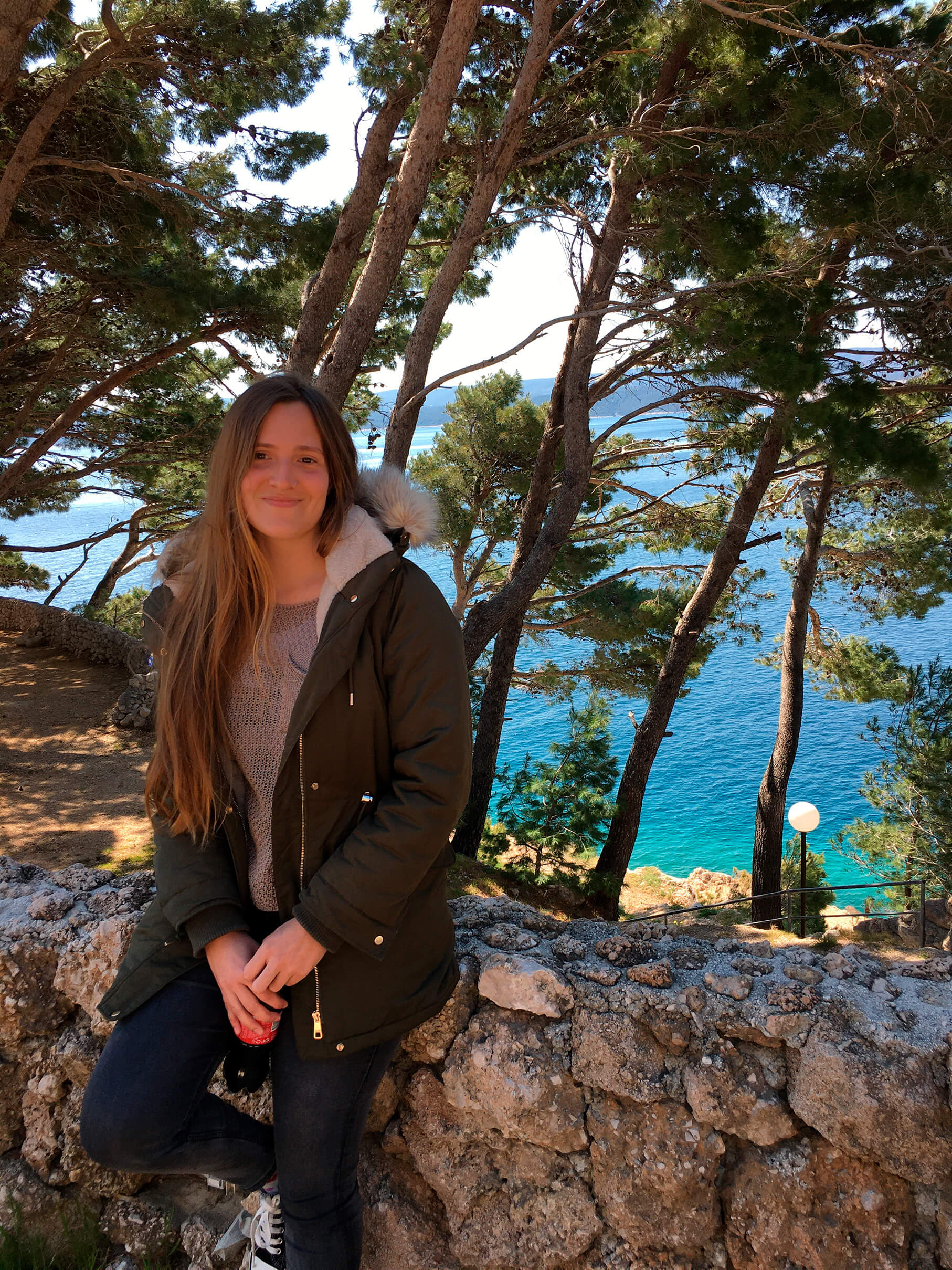
Nadia was born in Buenos Aires, Argentina, in 1994. All of her grandparents are Croatian. (Personal album)
What did you know about your relatives in Croatia?
It was always quite a complicated story because all of my dad's grandparents are Croatian and most of them had a very large family. I know a lot about my great-grandmother Ermenegilda Stanić because they were like twelve siblings and my grandmother went to Argentina because my great-great-grandfather arranged her marriage to a rancher so that she would have a good future in financial terms. When she arrived in Argentina she fell in love with my great-grandfather Duje Runje, a Croatian who worked as a laborer in that ranch. Obviously, it was something very strong for all of his family and my dad always talked to me about the two of them. He doesn't have much information about his paternal great-grandparents because my grandfather, Spiro Milevcic, died when my dad was four years old.
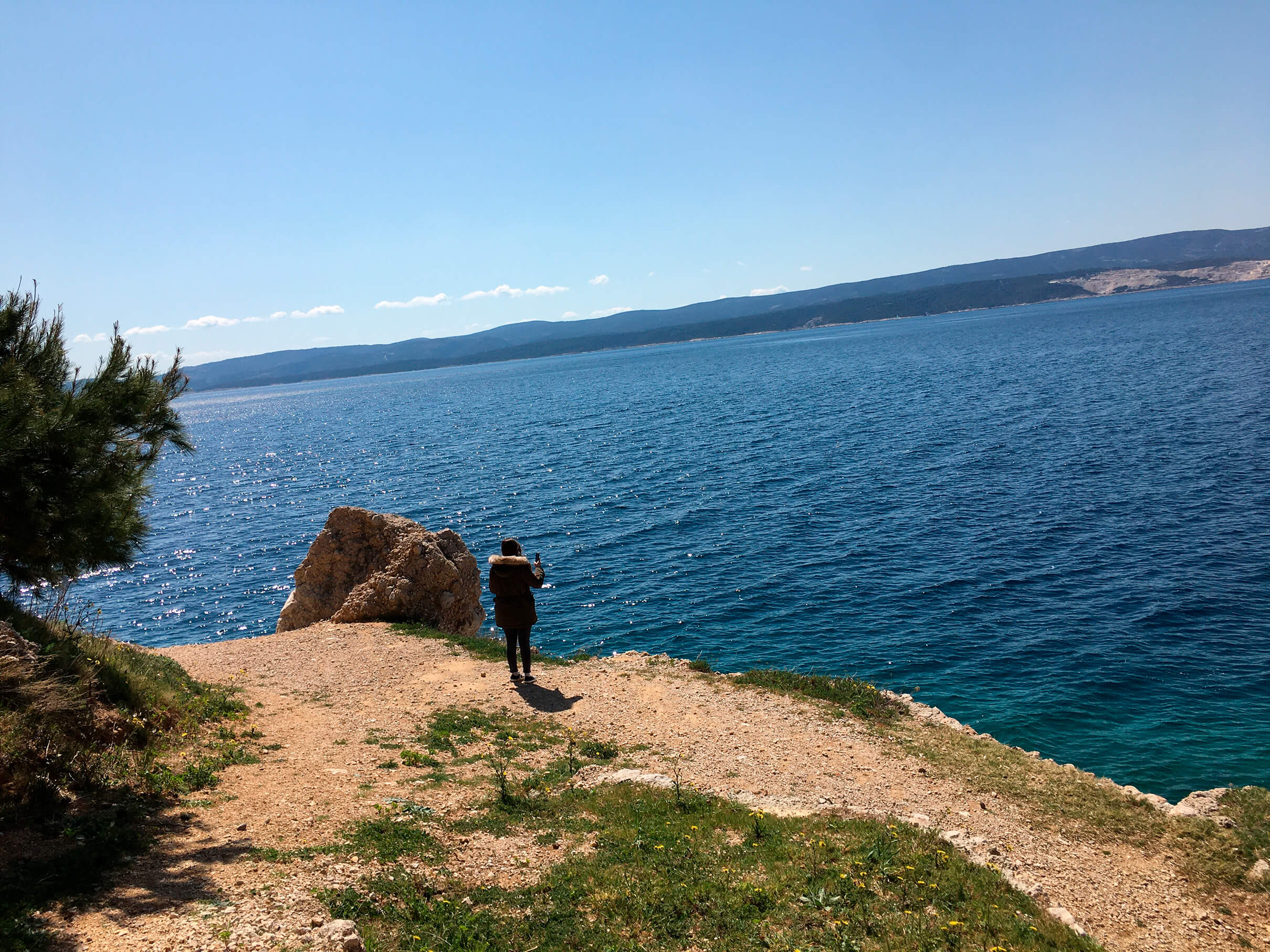
Nadia, who was living and working in Rijeka at the time, decided to travel to Dalmatia for vacation. She hadn't planned to find out about her family on the trip. (Personal album).
Did you have any expectations or plans to meet them?
Yes, my dad has a book that the Stanić family wrote about the descent of the twelve siblings. All the names appear there, including mine. The whole family has it and thanks to that my cousin contacted me from Croatia. It was just the same year that I won the scholarship. She told me that she lived in Rijeka and thanks to that I chose this city as the place where I was going to study for the Croatian language scholarship. This is how I met the descendants of one of the Stanić brothers, but I also knew that she had much more family in Croatia. Last year I didn't meet anyone else because most of them live in Dalmacija.
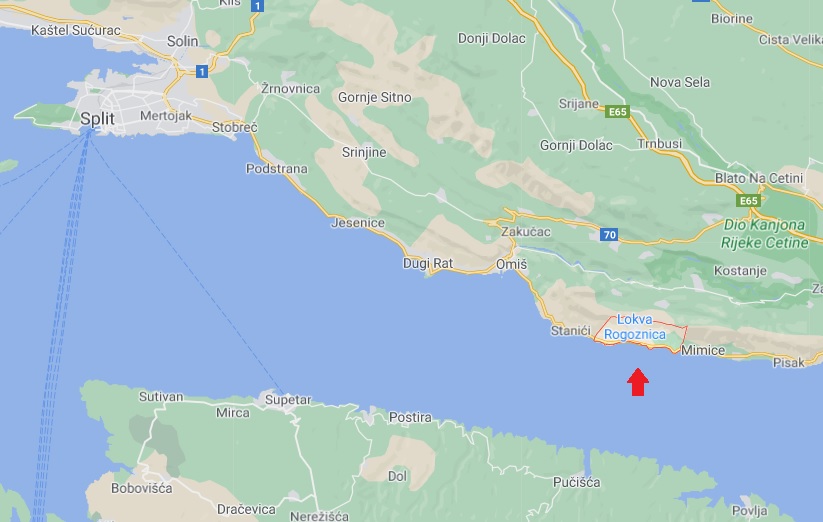
Lokva Rogoznica is a Dalmatian town, one hour away south of Split and 10 minutes away from Omiš. (Google Maps)
The day you met your distant relative, what were you doing and where?
Last month I went on vacation to Split and decided to go to Lokva Rogoznica, a town about an hour away because my great-grandmother was born there. My dad and my Croatian cousins had asked me to go meet him, but it was not my plan to look for anyone there, just take a couple of photos and see what the place was like.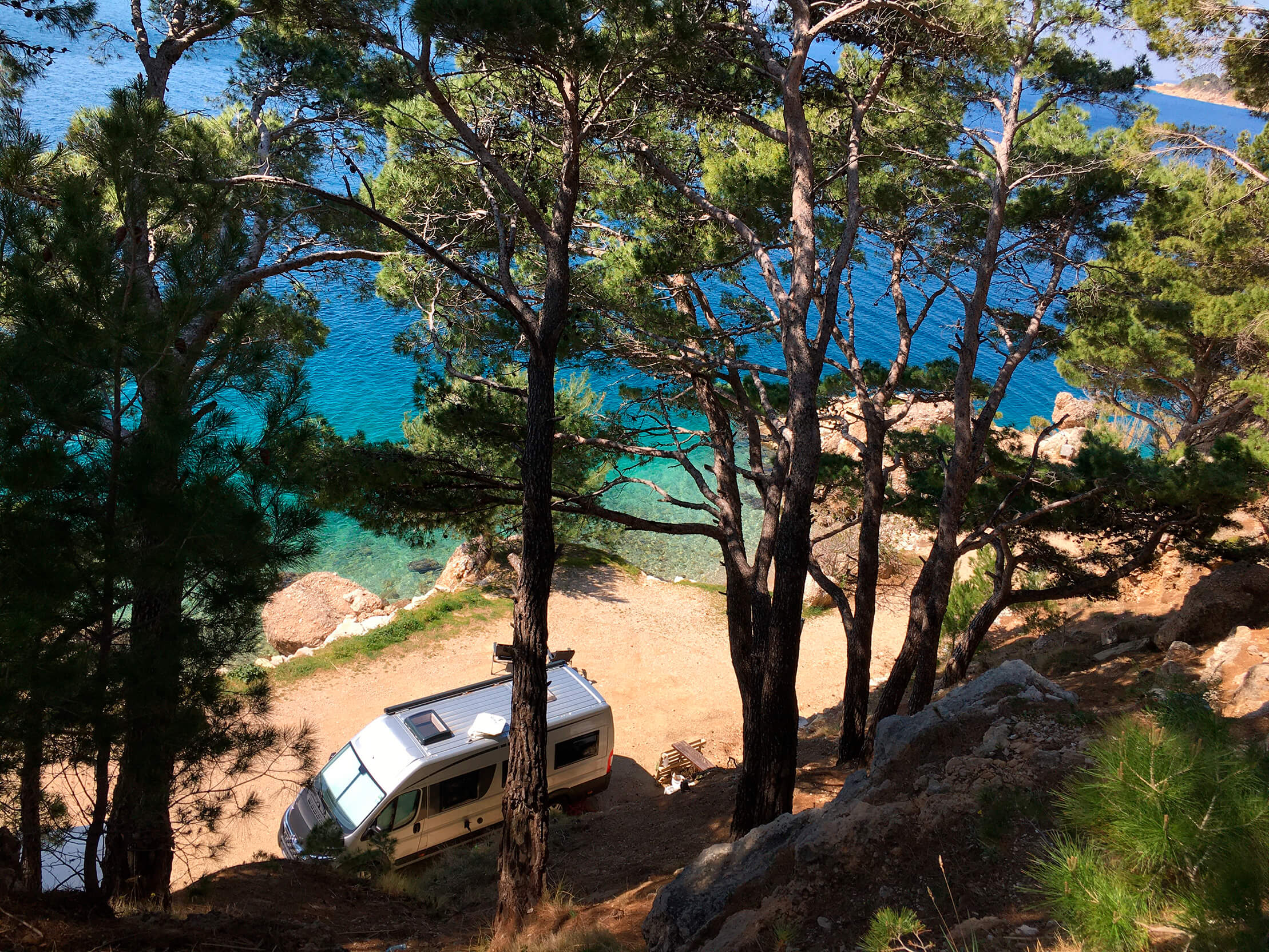
''La Sirena'' autokamp, in Lokva Rogoznica, the town where Nadia's family originated. (Personal album).
How was the encounter?
We stopped at a sign on the route to take a picture of me and we wanted to go down to the beach. I saw that there was a sign for an autokamp and that the beach was private. I remembered my cousins telling me that one of the Stanić was the owner of a campsite somewhere in Dalmacija, but I didn't know where. When we were about to go down to the beach, the owner of the campsite appeared and told me that the beach was private and that we couldn't enter. I don't know why it occurred to me that this could be my relative and I asked him if his last name was Stanić. He said yes and at that moment I told him that we were family because I was Ermenegilda's great-granddaughter. At that moment his face changed completely and he asked me if my great-grandmother had traveled to Argentina. When I said yes, he came closer to me and gave me a hug, and introduced himself as Milan Stanić.
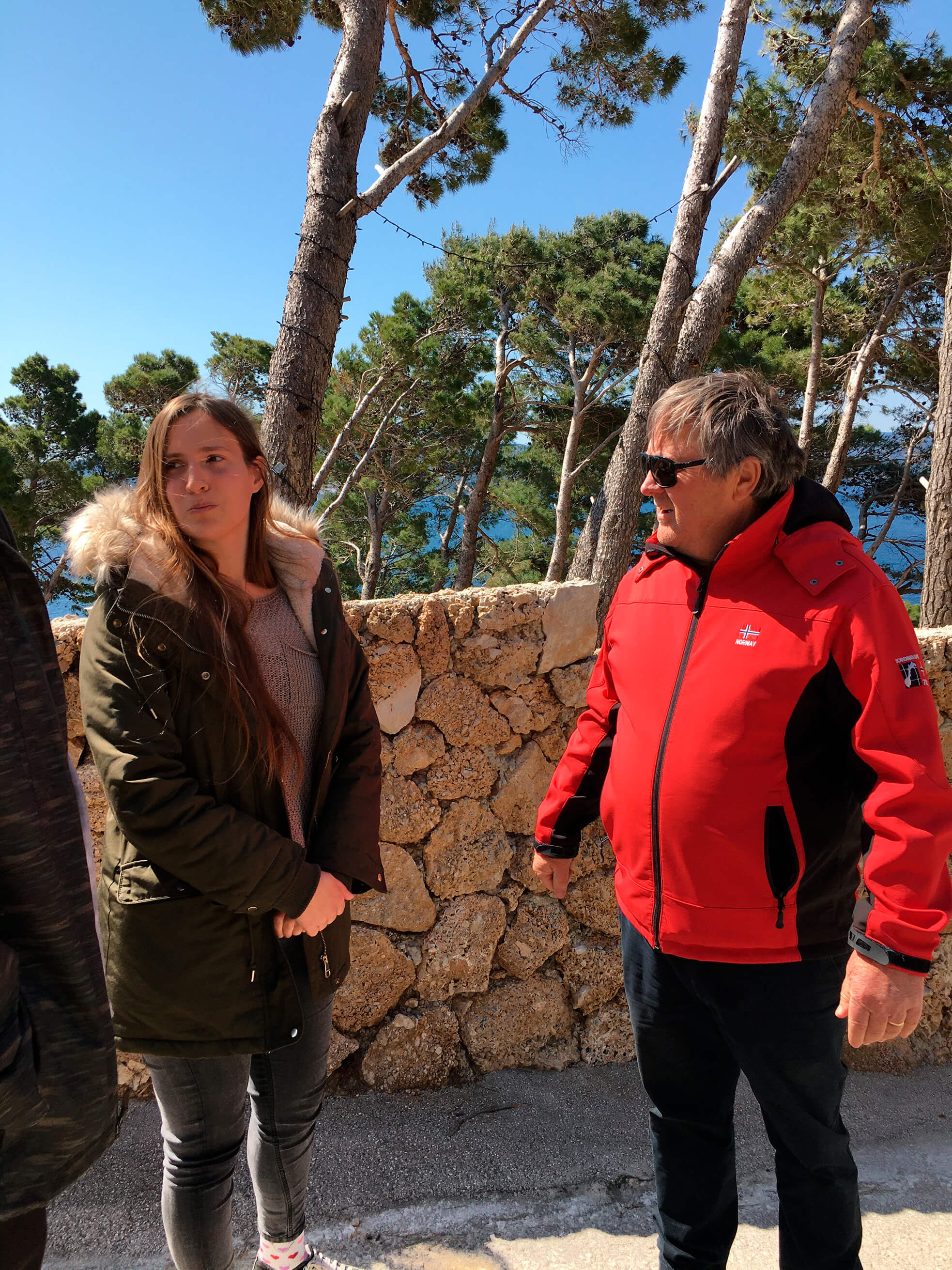
Nadia, soon after she met her distant relative, Milan Stanić. (Personal album)
How did you feel when the last names matched?
I felt very good and very strange at the same time. I was thinking of my dad because his desire was always to meet his Croatian family. I was the first person in my family to return to Croatia and from the first moment, I felt that it was my task to re-establish the bond with the other descendants. I also thought that I had come to take a photo and I ended up leaving with one more piece of my family. I like to think that it was something that had to happen and that it was time for us to meet.
What was his reaction when he found out?
He was very excited and very happy. From the first moment, he was very open with me and he introduced me to all of his family. That day we had lunch and dinner together. It was a very nice moment because all his daughters and his wife welcomed me very well and everyone was interested in talking to me.
Are you still in touch with him?
We don't talk every day, but I have his number and my cousin’s Facebook, so I can let them know the day I'm going to visit them again. They know that I am living in Rijeka and that I am working, but that at the end of the summer I am going to travel with my brother so that he can meet them too.
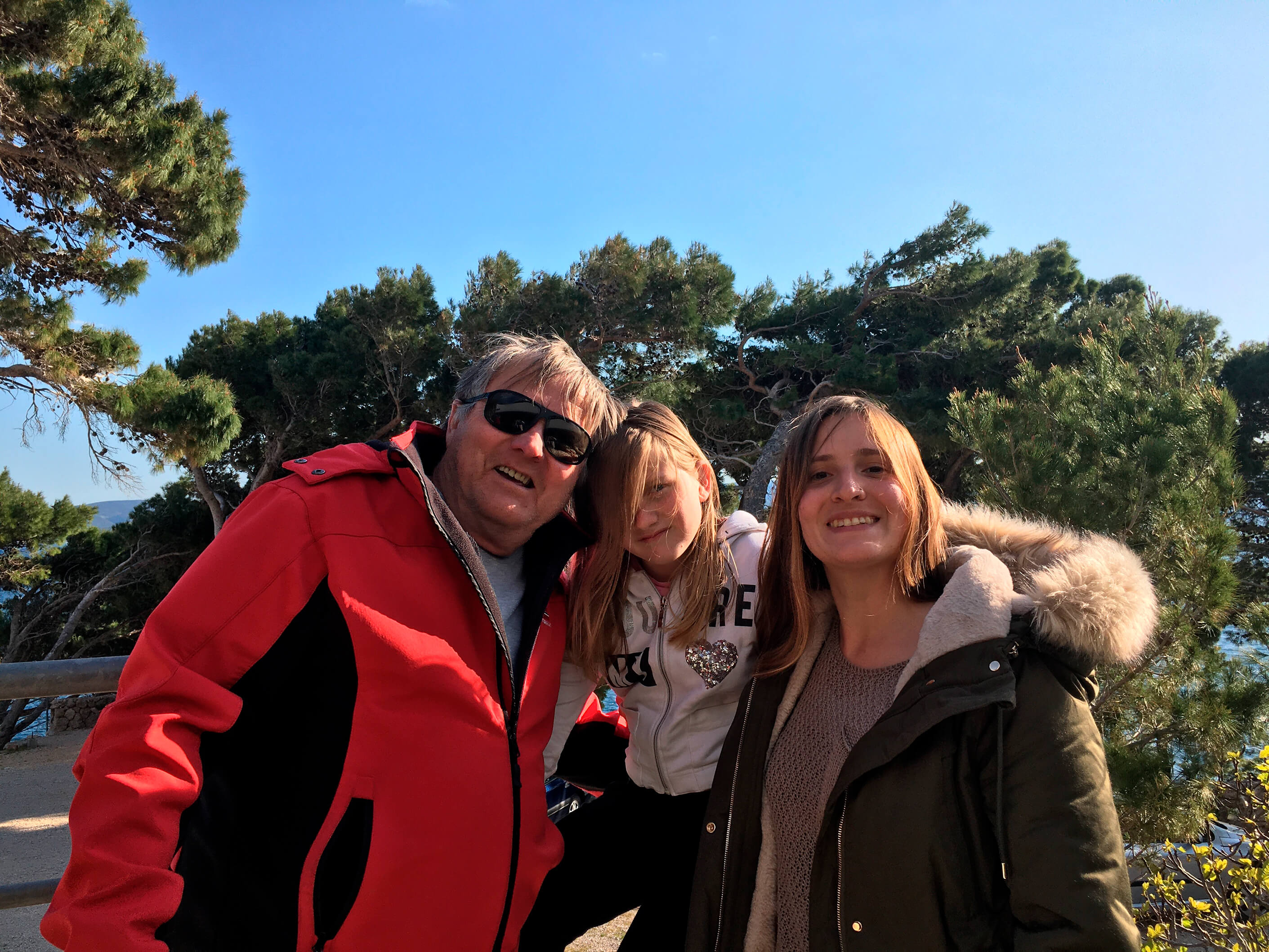
Milan, his daughter, and Nadia. (Personal album)
What is your goal in Croatia? Would you like to stay?
My idea of Croatia totally changed over time. When I arrived I planned to stay for only four months to study, but then I applied again for a second semester. I think that the decision to reapply for the scholarship was no longer motivated by the desire to know another culture, but was related to the fact that I felt good in Croatia and that I still did not want to go back to Argentina. Nowadays I am more established with the Croatian language and culture, but I cannot tell you that I want to stay permanently. I feel a strong connection to Croatia, but I also have my best friends and family in Argentina. Every day I miss my country and the people who live there and that is why I know that I will return to my country at some point. I sincerely feel that one half is here and another half is there in Argentina and for that reason, I would like to go and come back, spend some time in each country. I think it is a decision that is made every day. I can only tell you that today I choose to stay here.
The Croatian diaspora in South America is one of the largest in the world, and we at Total Croatia and Total Croatia News are committed to developing more on the subject in the coming months. If you belong to the Croatian diaspora in South America and want to share with us a story of reuniting with your distant relatives or your experience living in the land of your ancestors, you can send an email to This email address is being protected from spambots. You need JavaScript enabled to view it..
For more about the Croatian diaspora in South America, visit our dedicated page here.


